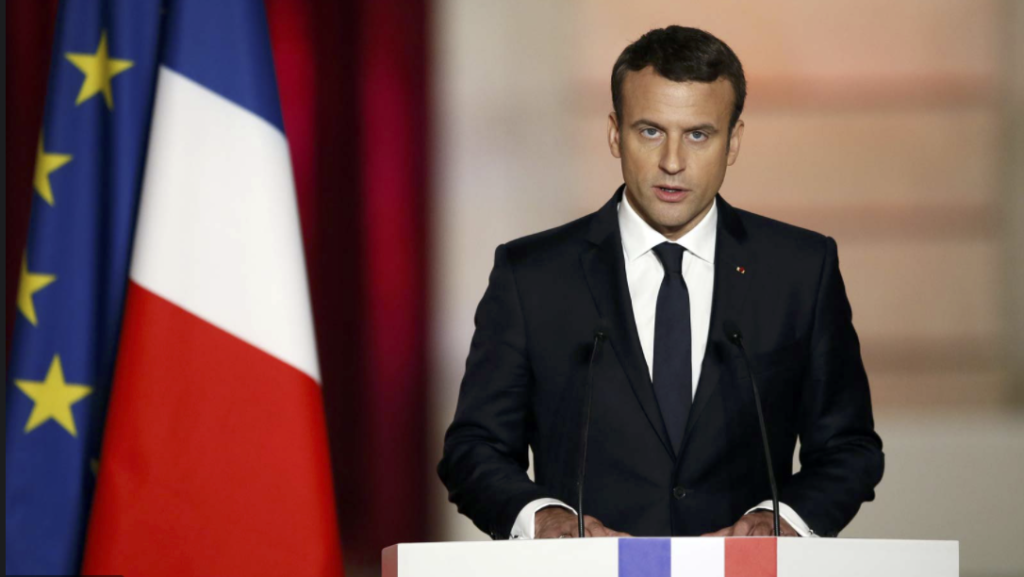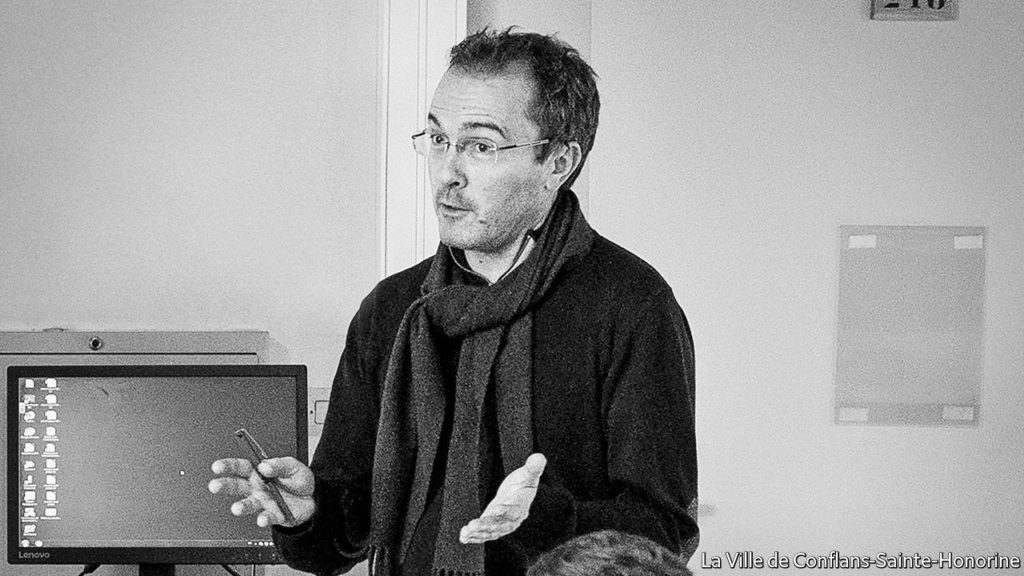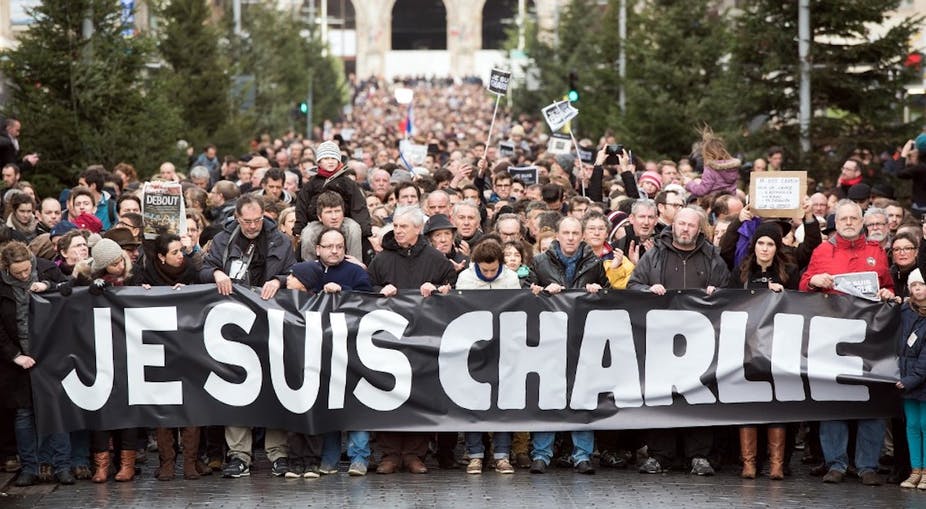Samuel Paty was beheaded for showing satirical cartoons. It was a tragedy, but unfortunately not the first time an attack like this has happened on French soil. We must defend freedom of speech at all costs and stand up against bigots, or risk undermining a fundamental aspect of Western society.
In October 2020, Samuel Paty, a French middle-school teacher, taught a class about freedom of expression. During the lesson, he showed his students a Charlie Hebdo satirical cartoon involving the Islamic prophet Muhammad. A week and a half after this class, Paty was beheaded near the school in which he taught. The perpetrator, Abdoullakh Anzorov, was later confronted and shot by the police. Anzorov even had the audacity to upload a photograph of Paty’s severed head on Twitter with the caption, “I executed one of your hellhounds who dared to belittle Muhammad…”. French President Emmanuel Macron described the incident as “a typical Islamist terrorist attack”, and Charlie Hebdo released a statement expressing its “horror and revolt”.
At face value, this should shock and disgust people around the world (and it has); however, this is not the first time that such an attack has taken place in France. In 2015, Charlie Hebdo released a satirical cartoon (the same one that Paty showed in class). As a result, two Islamist gunmen forced their way into their headquarters and opened fire, slaughtering twelve people. One of the gunmen was reported to have shouted: “the Prophet is avenged”. In both cases, the suspects made it clear that the deaths were due to people ridiculing and mocking Muhammad, an important figure in Islam. It sets a dangerous precedent when insulting Muhammad leads to death, and raises questions as to how world governments will react to incidents that involve ‘hate’ speech.

There are two things to consider regarding freedom of speech. One is the idea of what free speech is and who decides what hate speech is and isn’t, and the other is the deafening silence from the left and their selective outrage. The latter of the two will be discussed in a follow-up to this article, and the former will be discussed in this one. Regarding free speech, one must first recognise what free speech is. Freedom of expression is recognised as a human right under Article 19 of the Universal Declaration of Human Rights (UDHR) and is also acknowledged in the majority of international human rights legislation, in the International Covenant on Civil and Political Rights (ICCPR). Article 19 states: ‘everyone shall have the right to freedom of expression; regardless of frontiers, either orally, in writing or in print, in the form of art, or through any other media of his choice.”
There are boundaries to this definition, to allow for reasonable limitations such as slander, copyright infringement and the right to privacy. Even so, the sentiment is very clear; people have the right to speak and express themselves freely. The issue arises when we realise that freedom of speech and expression cannot always be recognised as being absolute and that there are mitigating factors to consider. Further on in Article 19, it states that the exercise of these rights can be ‘subject to certain restrictions’, or for ‘public order, health and morals”. It is clear that there are nuances to consider, and rightfully so. The million-dollar question is, who decides where the boundaries of freedom of expression begin and end?

This is an important question to ask, as it is a fundamental aspect of Western society. The group of people who have the authority to determine this hold a lot of power, perhaps disproportionately so. The idea of what is hateful is incredibly subjective, as we are individuals with our own likes and dislikes. There might be a certain type of comedy that will entertain one person and disgust another. Nobody likes or dislikes everything, and as individuals, we have the right to choose that for ourselves. The issue with the idea of ‘hate speech’ is that there is an absolute determination as to what constitutes as ‘hateful’, thereby infringing on an individual’s rights to express said ‘hate speech’. Such a law could easily be twisted and manipulated to conform to one person or group’s worldview. If the standard becomes their worldview, the logical conclusion would be mass censorship and a monolithic way of thinking. Cases such as Charlie Hebdo and Samuel Paty demonstrate that there are people who believe that their beliefs and worldview are above criticism, scrutiny and ridicule; a false and fraudulent belief. No ideology, religion or organization has the right to not be commented on, or to not be challenged, or not to be laughed at. This is the basic premise of freedom of expression.
To determine where freedom of speech begins and ends grants the decision-maker a lot of power. This is arguably why those on the left are pushing for ideologies such as communism, socialism and Marxism, in which power is consolidated to a handful on individuals who make decisions on behalf of the population. Everything would be state-controlled, and freedom of the press would be virtually non-existent. This is not unlike China’s current communist state, where all digital software is state-controlled. It does seem as though it is a competition between groups which society deems to be ‘marginalised’. There is a constant need to ‘one-up’ each other. Every group claims to have suffered the worst historically, which justifies a contemporary power grab as restitution.

If any group were to win this ‘competition’, dubbed ‘the victim Olympics’ online, their next step would be to reshape the definition of hate speech to suit their goals. It would now become an offence to speak out against the particular group of people in power, effectively making them untouchable; not unlike dictatorships throughout human history. There are already figures on the left that support this; Black Lives Matter co-founder Patrisse Cullors identified herself and her organizers as ‘trained Marxists’. In the case of the Islamists in both cases in France, they have gone one step further and are now attempting to make their beliefs untouchable by killing those who ridicule it. It’s a form of blackmail: ‘if you speak about us in a bad way, we will kill you’. This is undeniable bigotry, at its core, and we must fight it at all costs or risk losing our freedoms.
This is a human rights issue. To make a law – any law – that protects one group of people over others is to undermine freedom of speech itself. A person does not have to condone satirical, offensive media (such as the Charlie Hebdo Mohammad cartoons), but they must also recognise that the right to publish such a cartoon must be protected at all costs. There are many reasons why certain language or symbols should not be used; good character and respect for your fellow human being are two that come to mind. However, one of those reasons should not be for fear of your life, which unfortunately was the case in France in 2020 and 2015. The fundamental definitions of ‘hate speech’ and ‘freedom of speech’ cannot logically co-exist. Either we as a society believe in freedom of speech for all – emphasis on ALL – or we don’t.
Power corrupts, and absolute power corrupts absolutely.


